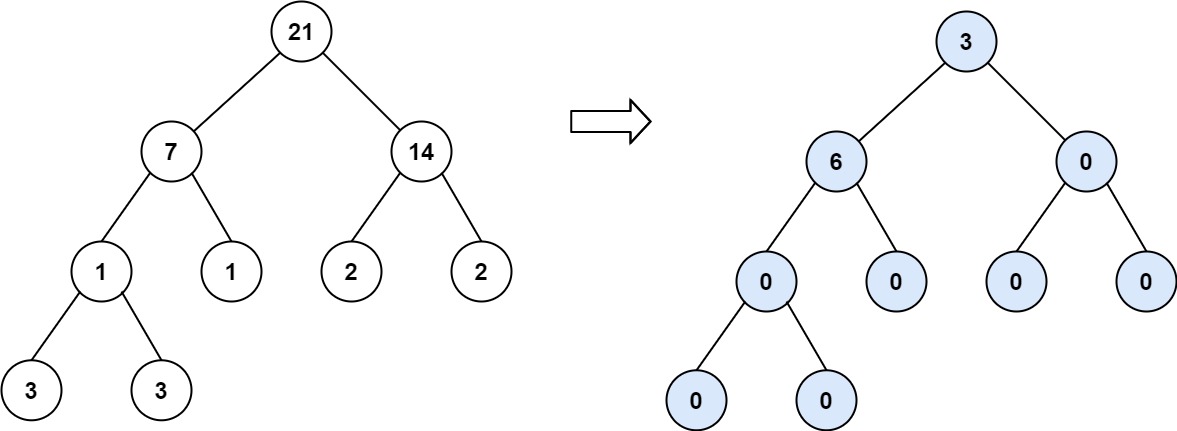563. Binary Tree Tilt
Given the root of a binary tree, return the sum of every tree node’s tilt.
The tilt of a tree node is the absolute difference between the sum of all left subtree node values and all right subtree node values. If a node does not have a left child, then the sum of the left subtree node values is treated as 0. The rule is similar if there the node does not have a right child.
1
2
3
4
5
6
7
8
9
| Example 1:
Input: root = [1,2,3]
Output: 1
Explanation:
Tilt of node 2 : |0-0| = 0 (no children)
Tilt of node 3 : |0-0| = 0 (no children)
Tilt of node 1 : |2-3| = 1 (left subtree is just left child, so sum is 2; right subtree is just right child, so sum is 3)
Sum of every tilt : 0 + 0 + 1 = 1
|

1
2
3
4
5
6
7
8
9
10
11
12
| Example 2:
Input: root = [4,2,9,3,5,null,7]
Output: 15
Explanation:
Tilt of node 3 : |0-0| = 0 (no children)
Tilt of node 5 : |0-0| = 0 (no children)
Tilt of node 7 : |0-0| = 0 (no children)
Tilt of node 2 : |3-5| = 2 (left subtree is just left child, so sum is 3; right subtree is just right child, so sum is 5)
Tilt of node 9 : |0-7| = 7 (no left child, so sum is 0; right subtree is just right child, so sum is 7)
Tilt of node 4 : |(3+5+2)-(9+7)| = |10-16| = 6 (left subtree values are 3, 5, and 2, which sums to 10; right subtree values are 9 and 7, which sums to 16)
Sum of every tilt : 0 + 0 + 0 + 2 + 7 + 6 = 15
|

1
2
3
4
| Example 3:
Input: root = [21,7,14,1,1,2,2,3,3]
Output: 9
|

Constraints:
- The number of nodes in the tree is in the range [0, 104].
- -1000 <= Node.val <= 1000
Solution#
1
2
3
4
5
6
7
8
9
10
11
12
13
14
15
16
17
18
19
20
21
22
23
24
25
26
27
28
29
30
31
32
33
34
35
36
| class Solution {
int[][] dirs = new int [][] {
{1, 0},
{-1, 0},
{0, 1},
{0, -1}
};
public int closedIsland(int[][] grid) {
int count = 0;
for (int i = 0; i < grid.length; i++) {
for (int j = 0; j < grid[0].length; j++) {
if (grid[i][j] == 0 && dfs(i, j, grid)) count++;
}
}
return count;
}
boolean dfs(int i, int j, int[][] grid) {
if (i < 0 || i >= grid.length
|| j < 0 || j >= grid[0].length) {
return false;
}
if (grid[i][j] == 1) {
return true;
}
grid[i][j] = 1;
boolean closed = true;
for (int[] dir: dirs) {
closed = closed & dfs(dir[0] + i, dir[1] + j, grid);
}
return closed;
}
}
|


